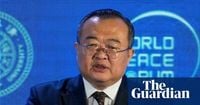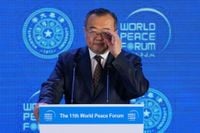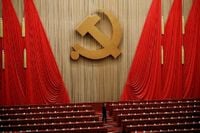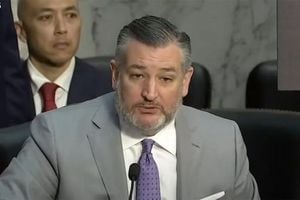In a significant shake-up at the top of China’s diplomatic machinery, Liu Haixing—a veteran security official and career diplomat—has been appointed as the new head of the International Department of the Communist Party of China Central Committee (IDCPC), replacing the high-profile Liu Jianchao. The move, which became apparent on September 30, 2025, when Liu Haixing’s profile appeared on the department’s official website, comes amid swirling speculation about the fate of his predecessor, who has not been seen in public since late July and is reportedly under investigation.
The IDCPC, a ministerial-level body, plays a crucial role in managing the Communist Party’s relationships with more than 600 foreign political parties across the spectrum, including ruling and opposition parties, as well as maintaining direct lines to other socialist states such as North Korea. This department acts as a key channel for China’s party-to-party diplomacy, complementing the more traditional state-to-state work of the Ministry of Foreign Affairs. According to Caixin, the department’s growing prominence in recent years has been instrumental in building support for major initiatives like the Belt and Road Initiative and in training foreign officials—a soft power strategy that has only intensified since the COVID-19 pandemic.
Liu Haixing, 62, brings to the role a wealth of experience from both diplomatic and security spheres. Fluent in French, Liu joined the Ministry of Foreign Affairs in 1985, serving in France and at the United Nations before leading the ministry’s Department of European Affairs. He rose to assistant minister of foreign affairs in 2015, a rank just below vice-minister, and in 2018 transitioned to the Office of the Central National Security Commission, which is chaired by President Xi Jinping. By November 2022, he was deputy director in charge of daily operations at this powerful security body, as reported by Caixin. Liu Haixing was also elected to the Communist Party’s 20th Central Committee in October 2022, underscoring his status within the party’s upper echelons.
His predecessor, Liu Jianchao, 61, was known for his urbane and high-profile approach. A fluent English speaker who studied international relations at Oxford and served in China’s mission to the UK, Liu Jianchao had led the IDCPC since May 2022. During his tenure, he traveled to more than 20 countries, met officials from over 160 nations, and was considered by many as a likely candidate for the foreign minister post. His candid style and willingness to speak off the cuff in English made him stand out in a system known for its caution. In 2024, he even met with then-US Secretary of State Antony Blinken, fueling rumors of his upward trajectory.
But the abrupt end to his public appearances in late July 2025—shortly after returning from a trip to Algeria (or Africa, as some sources specify)—sparked immediate speculation. According to The Wall Street Journal and The Guardian, Liu Jianchao was reportedly detained for questioning as part of a disciplinary probe, with his personal profile swiftly removed from the IDCPC website. No official announcement has been made regarding his status, but the timing and opacity echo other recent high-profile disappearances in China’s political landscape. The fate of Liu Jianchao is now a focal point for observers, especially with the Communist Party’s Central Committee set to meet in late October. Many will be watching to see if he attends, though analysts like Associate Professor Alfred Wu of the Lee Kuan Yew School of Public Policy told The Straits Times, “It also signalled clearly that Mr Liu Jianchao is not coming back to politics.”
This leadership change at the IDCPC is part of a broader pattern under President Xi Jinping’s rule. Since taking office in 2012, Xi has led a sweeping campaign against corruption and misconduct, with more than 6 million officials punished, according to The Associated Press. Critics, however, argue that these purges serve a dual purpose—removing rivals and consolidating Xi’s grip on power. The recent disappearances of senior officials, including former foreign minister Qin Gang and defense ministers Li Shangfu and Wei Fenghe, have only heightened the sense of uncertainty at the top. Qin Gang, for example, was ousted in 2023 after just seven months as foreign minister, with his predecessor Wang Yi stepping back into the role. The pattern is clear: high-profile figures can vanish overnight, often amid rumors of disciplinary investigations.
For the IDCPC, the appointment of Liu Haixing marks a shift in tone, if not direction. As The Straits Times reports, analysts believe that despite the contrasting styles of the two Lius, the department’s core function remains unchanged. “I don’t foresee any major shift in how the party engages the world,” said Professor Wu, noting that the IDCPC implements rather than sets foreign policy, which is determined by the party’s top leadership. The recent personnel moves, including the earlier replacement of foreign minister Qin Gang, suggest a preference for steady, experienced hands over charismatic stars—a trend that may reflect a desire for stability amid turbulent times.
Under Xi Jinping, the Party’s influence over foreign policy has grown markedly, with the Ministry of Foreign Affairs increasingly relegated to a logistical role. The IDCPC’s expanded reach—now encompassing relationships with hundreds of parties worldwide—has become a vital tool in China’s dual-track diplomacy. This approach enables Beijing to bypass traditional government channels, forging ideological and practical alliances that can outlast electoral cycles and regime changes in partner countries. It also allows the party to shape narratives and cultivate support for its global ambitions, particularly through initiatives like the Belt and Road.
The circumstances surrounding Liu Jianchao’s disappearance remain murky. Reports from The Guardian and The Wall Street Journal suggest he is under investigation for alleged corruption and violations of party discipline. Notably, Liu himself previously worked for the Central Commission for Discipline Inspection, China’s anti-corruption agency. One of his deputies, Sun Haiyan, was also reportedly questioned in August, though she has since resurfaced at public events. The lack of transparency is characteristic of the party’s handling of internal discipline, where officials can be removed from public life without explanation, sometimes reemerging years later—or not at all.
As China enters its National Day holiday, with the leadership laying flowers at Tiananmen Square for Martyrs’ Day and holding a reception at the Great Hall of the People, the reshuffle at the IDCPC is a reminder of the volatility and opacity at the heart of Chinese politics. While the world watches for signs of shifts in Beijing’s foreign engagement, the message from the top seems to be one of continuity—at least for now. With Liu Haixing’s steady hand at the helm, the IDCPC is expected to continue its mission, even as the fate of its former leader remains shrouded in mystery.
In the ever-evolving landscape of Chinese diplomacy, change can come suddenly and without warning. Yet, for all the intrigue, the machinery of party-to-party engagement keeps turning, shaping China’s global ties one relationship at a time.






